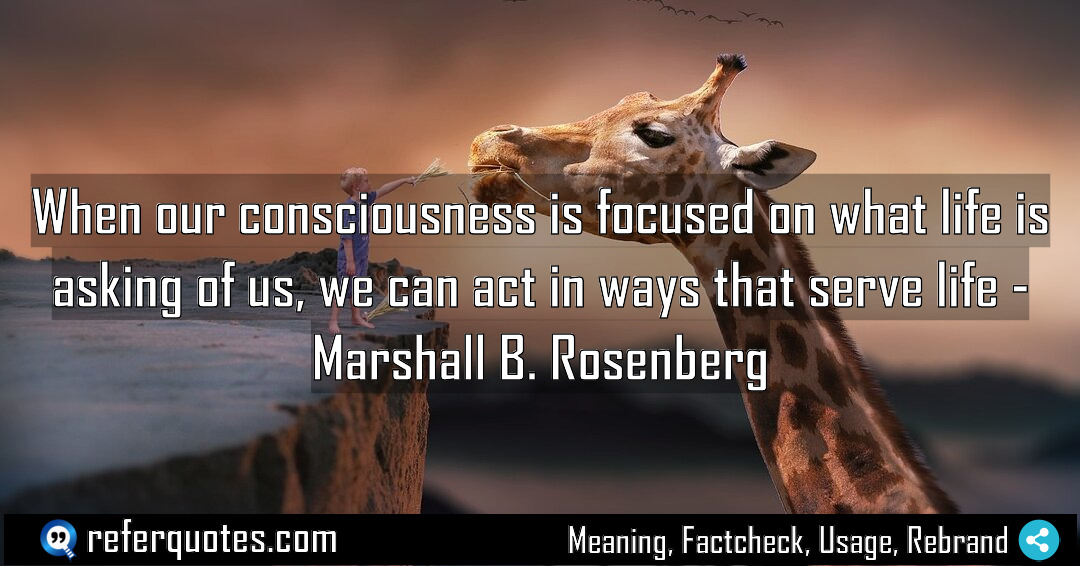
When our consciousness is focused on what life is asking, we shift from reacting to serving. It’s a game-changing mindset that turns conflict into connection. This simple reframe is the heart of Nonviolent Communication.
Share Image Quote:
Table of Contents
Meaning
At its core, this quote is about shifting from a mindset of judgment and reaction to one of empathy and contribution. It’s asking us to listen to the needs of a situation, not just our own internal commentary about it.
Explanation
Let me break this down because it’s deceptively simple. Most of the time, when a conflict happens, our “consciousness is focused” on what’s wrong with the other person, or why we’re right, or how we’re being treated unfairly. We’re in a kind of mental battle. Rosenberg’s genius was to say, “Stop. Pause the battle.”
Instead, ask: “What is life asking of me right now? What needs are not being met—in me, in them, in this room?”
When you make that shift, your entire energy changes. You’re no longer a combatant; you become a facilitator for life. Your actions naturally start to serve the situation, to find solutions that work for everyone. It’s not about being a doormat. It’s about being profoundly powerful in a different way. It’s strategic empathy.
Quote Summary
Reading Level80
Aesthetic Score90
Origin & Factcheck
This is straight from Marshall B. Rosenberg’s 1999 book, Nonviolent Communication: A Language of Life. It’s a cornerstone of the NVC model he developed, primarily in the United States. You sometimes see the sentiment echoed in other peace studies, but this specific phrasing is uniquely Rosenberg’s.
Attribution Summary
Where is this quotation located?
| Quotation | When our consciousness is focused on what life is asking of us, we can act in ways that serve life |
| Book Details | Publication Year: 1999; ISBN: 9781892005038; Last edition: 3rd Edition (2015); Number of pages: 264. |
| Where is it? | Conclusion, Page 203 (2015 edition) |
Context
In the book, this idea isn’t presented as a fluffy, spiritual notion. It’s a practical tool. It comes up when discussing how to handle anger and conflict. Rosenberg argues that anger is a result of life-alienating thinking—judgments and “shoulds.” When we cut through that and connect to the underlying human needs, that’s when we can truly serve life.
Usage Examples
So how does this work in the real world? Let’s say…
In a Heated Team Meeting: Instead of thinking “My colleague is being deliberately obstructive,” you ask, “What is life asking of us? It’s asking for a clear decision and for everyone to feel heard.” Your next action might be to summarize points and check for understanding, which serves that need.
With a Frustrated Partner: Instead of preparing your defense, you get curious. “What is life asking for here? Probably for care and reassurance.” Your action might be to listen deeply, which serves that need for connection.
For Leaders & Managers: This is pure gold. When your team is stuck, asking “What does this situation need to move forward?” is infinitely more productive than asking “Who is to blame?”
To whom it appeals?
Share This Quote Image & Motivate
Motivation Score90
Popularity Score85
Shareability Score85
FAQ
Question: Isn’t this just about putting others’ needs before your own?
Answer: Not at all. That’s a common misunderstanding. “Life” includes your life, your needs. It’s about finding strategies that honor everyone’s needs, including your own. It’s the opposite of self-sacrifice.
Question: How is this different from just being a nice person?
Answer: Being “nice” can be inauthentic and resentful. This is about authenticity. It’s a conscious, strategic choice to connect with what’s alive in a situation. It requires courage, not just politeness.
Question: Can you really apply this in a high-stakes business negotiation?
Answer: Absolutely. In fact, that’s where it’s most powerful. Understanding what the other side truly needs (security, recognition, stability) allows you to craft win-win solutions that a purely adversarial stance would never uncover.
Similar Quotes
The purpose of life is a life of purpose. It sounds simple, right? But that’s where its real power lies. It’s a complete reframe of one of our biggest questions.…
Life-enriching communication asks us to give from the heart. It’s a game-changing mindset that transforms conflict into connection. Let’s break down what Rosenberg really meant by this. Table of Contents…
When we give ourselves empathy, we allow our true self to emerge. It’s about creating a safe space internally, so your authentic self can finally show up without fear or…
When we meet others with empathy, we transcend our judgments… It’s a game-changer because it shifts the entire dynamic of a conversation from conflict to connection. You stop seeing people…
You know, the more we are connected to our feelings, the more we stop fighting ourselves and start making choices that genuinely serve us. It’s like having an internal compass…
